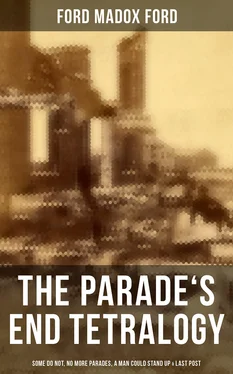‘I took you to Russia,’ Tietjens said. ‘I remember it all now—because I had an order from Sir Robert Ingleby to assist the British Consul-General in preparing a Blue Book statistical table of the Government of Kiev . . . It appeared to be the most industrially promising region in the world in those days. It isn’t now, naturally. I shall never see back a penny of the money I put into it. I thought I was clever in those days . . . And of course, yes, the money was my mother’s settlement. It comes back . . . yes, of course . . .
‘Did you,’ Sylvia asked, ‘get out of taking me to your mother’s funeral because you thought I should defile your mother’s corpse by my presence? Or because you were afraid that in the presence of your mother’s body you wouldn’t be able to conceal from me that you thought I killed her? . . . Don’t deny it. And don’t get out of it by saying that you can’t remember those days. You’re remembering now: that I killed your mother: that Miss Wannop sent the telegram—why don’t you score it against her, that she sent the news? . . . Or, good God, why don’t you score it against yourself, as the wrath of the Almighty, that your mother was dying while you and that girl were croodling over each other? . . . At Rye! Whilst I was at Lobscheid . . .
Tietjens wiped his brow with his handkerchief.
‘Well, let’s drop that,’ Sylvia said. ‘God knows, I’ve no right to put a spoke in that girl’s wheel or in yours. If you love each other you’ve a right to happiness and I daresay she’ll make you happy. I can’t divorce you, being a Catholic; but I won’t make it difficult for you in other ways, and self-contained people like you and her will manage somehow. You’ll have learned the way from Macmaster and his mistress . . . But, oh, Christopher Tietjens, have you ever considered how foully you’ve used me !’
Tietjens looked at her attentively, as if with magpie anguish.
‘If,’ Sylvia went on with her denunciation, ‘you had once in our lives said to me: “You whore! You bitch! You killed my mother. May you rot in hell for it . . . ” If you’d only once said something like it . . . about the child! About Perowne! . . . you might have done something to bring us together . . . ’
Tietjens said:
‘That’s, of course, true!’
‘I know,’ Sylvia said, ‘you can’t help it . . . But when, in your famous county family pride—though a youngest son!—you say to yourself: And I daresay if . . . Oh, Christ! . . . you’re shot in the trenches you’ll say it . . . oh, between the saddle and the ground! that you never did a dishonourable action . . . And, mind you, I believe that no other man save one has ever had more right to say it than you . . . ’
Tietjens said:
‘You believe that!’
‘As I hope to stand before my Redeemer,’ Sylvia said, ‘I believe it: . . . But, in the name of the Almighty, how could any woman live beside you . . . and be for ever forgiven? Or no: not forgiven: ignored! . . . Well, be proud when you die because of your honour. But, God, be humble about . . . your errors in judgment. You know what it is to ride a horse for miles with too tight a curb-chain and its tongue cut almost in half . . . You remember the groom your father had who had the trick of turning the hunters out like that . . . And you horse-whipped him, and you’ve told me you’ve almost cried ever so often afterwards for thinking of that mare’s mouth . . . Well! Think of this mare’s mouth sometimes! You’ve ridden me like that for seven years . . .
She stopped and then went on again:
‘Don’t you know, Christopher Tietjens, that there is only one man from whom a woman could take ” Neither do I condemn thee “ and not hate him more than she hates the fiend! . . . ’
Tietjens so looked at her that he contrived to hold her attention.
‘I’d like you to let me ask you,’ he said, ‘how I could throw stones at you? I have never disapproved of your actions.’
Her hands dropped dispiritedly to her sides.
‘Oh, Christopher,’ she said, ‘don’t carry on that old playacting. I shall never see you again, very likely, to speak to. You’ll sleep with the Wannop girl to-night: you’re going out to be killed to-morrow. Let’s be straight for the next ten minutes or so. And give me your attention. The Wannop girl can spare that much if she’s to have all the rest . . . ’
She could see that he was giving her his whole mind.
‘As you said just now,’ he exclaimed slowly, ‘as I hope to meet my Redeemer, I believe you to be a good woman. One that never did a dishonourable thing.’
She recoiled a little in her chair.
‘Then she said, ‘you’re the wicked man I’ve always made believe to think you, though I didn’t.’
Tietjens said:
‘No! . . . Let me try to put it to you as I see it.’
She exclaimed:
‘No! . . . I’ve been a wicked woman. I have ruined you. I am not going to listen to you.’
He said:
‘I daresay you have ruined me. That’s nothing to me. I am completely indifferent.’
She cried out:
‘Oh! Oh! . . . Oh!’ on a note of agony.
Tietjens said doggedly:
‘I don’t care. I can’t help it. Those are—those should be—the conditions of life amongst decent people. When our next war comes I hope it will be fought out under those conditions. Let us, for God’s sake, talk of the gallant enemy. Always. We have got to plunder the French or millions of our people must starve: they have got to resist us successfully or be wiped out . . . It’s the same with you and me . . . ’
She exclaimed:
‘You mean to say that you don’t think I was wicked when I . . . when I trepanned is what mother calls it? . . . ’
He said loudly:
‘ No ! . . . You had been let in for it by some brute. I have always held that a woman who has been let down by one man has the right—has the duty for the sake of her child—to let down a man. It becomes woman against man: against one man. I happened to be that one man: it was the will of God. But you were within your rights. I will never go back on that. Nothing will make me, ever!’
She said:
‘And the others! And Perowne . . . I know you’ll say that anyone is justified in doing anything as long as they are open enough about it . . . But it killed your mother. Do you disapprove of my having killed your mother? Or you consider that I have corrupted the child . . . ’
Tietjens said:
‘I don’t . . . I want to speak to you about that.’
She exclaimed:
‘You don’t . . .!
He said calmly:
‘You know I don’t . . . while I was certain that I was going to be here to keep him straight and an Anglican, I fought your influence over him. I’m obliged to you for having brought up of yourself the considerations that I may be killed and that I am ruined. I am. I could not raise a hundred pounds between now and tomorrow. I am, therefore, obviously not the man to have sole charge of the heir of Groby.’
Читать дальше












